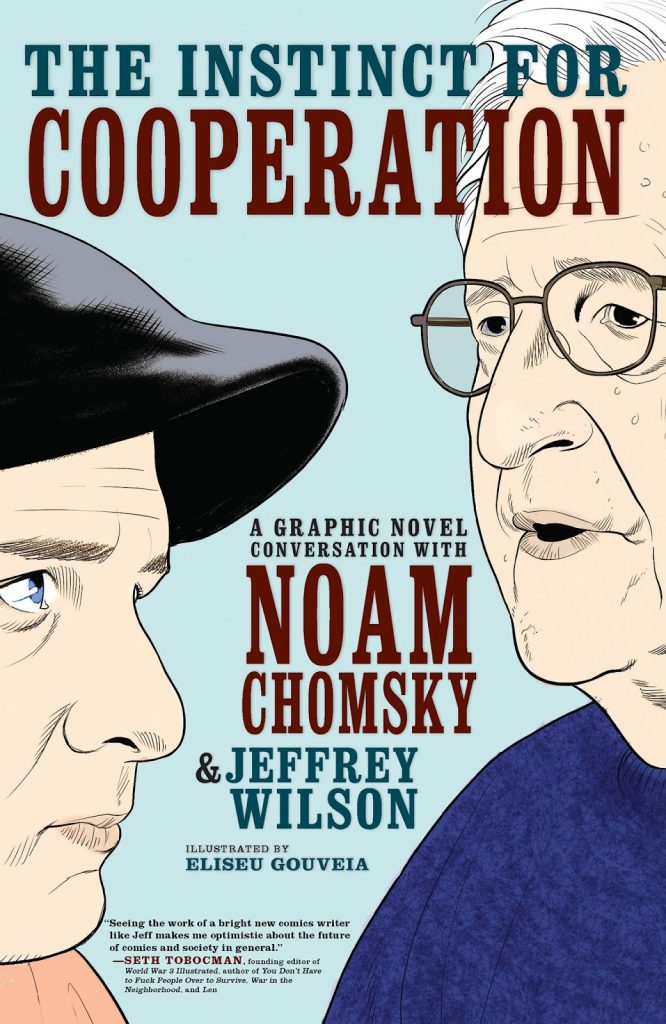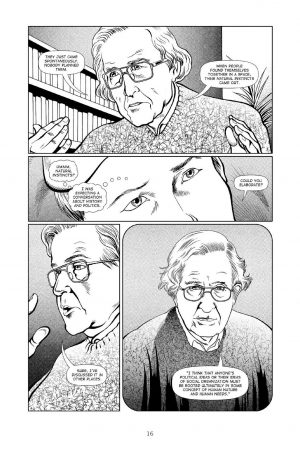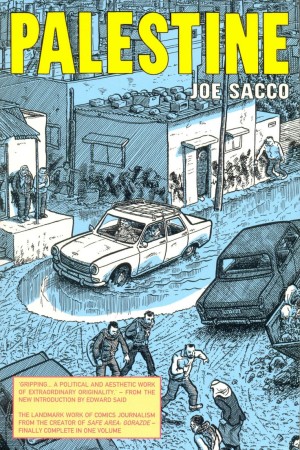Review by Ian Keogh
Noam Chomsky is a polymath whose interests cross boundaries, and who’s respected in every field. He’s shaped politics and policies, although probably not as much as he’d have liked as a considerate and understanding man. However, he’s also very much a scholarly thinker, and shapes his thoughts in scholarly language, which means The Instinct for Cooperation is limiting its audience despite Jeffrey Wilson attempting to make the discussion more accessible via the graphic novel format
The Instinct for Cooperation, interestingly lacking the traditional hyphen, is both interview and lecture, Wilson wanting to talk with Chomsky about the Occupy movement, but taking diversions to explore the references that come up, or to add background detail. An early sidebar concerns an extremely restrictive Arizona state law based at limiting educational opportunities for individual cultural groups.
The core concept is introduced in the third chapter, when Chomsky mentions that people learning in isolation is a restriction, and there’s a vested interest in that. Learning in isolation is passive, whereas people together in a class have greater opportunity for discussion that’s not just within a reflective bubble. Walker reinforces this by also interviewing people involved with social pressure organisations.
It’s a shame Eliseu Gouveia’s contribution is considered secondary. The lettering of his name is smaller on the cover, and internally Walker’s credit is in bold typeface and Gouveia’s slightly smaller without the bold. Yet in illustrating almost a hundred pages Gouveia is likely to have spent moe time working on the project than either Walker or Chomsky. He uses photo reference in drawing people, but places them in working environments, surrounded by others, and takes dry interview quotes and contextualises them, giving them an emotional resonance.
Occupy, specifically the library group formed within it, is used as an example of people spontaneously coming together and organising as an example of Chomsky’s point that its a natural expression of human need to have a form of solidarity, creative work and social justice. Other thoughts and examples spring from that, providing a brief history of some social movements, and the mutual aid that unites them all. It’s much like the Field of Dreams philosophy of if you build it, they will come, and it’s appropriate that the entire project was crowd-funded.
Chomsky sees a bigger picture of entrapment, and it’s fascinating to read how he draws seemingly disparate issues together. In terms of interviews he’s carried out, The Instinct for Cooperation is probably a briefer example, but it’s filled with meaningful comments, a particularly relevant one linking student debt to enslavement and noting other countries manage to offer free education. You may not believe so many factors are united in a deliberate form of suppression, but despite an occasionally dry presentation so much here provokes thought as intended. You’ll be better off for having read it.





